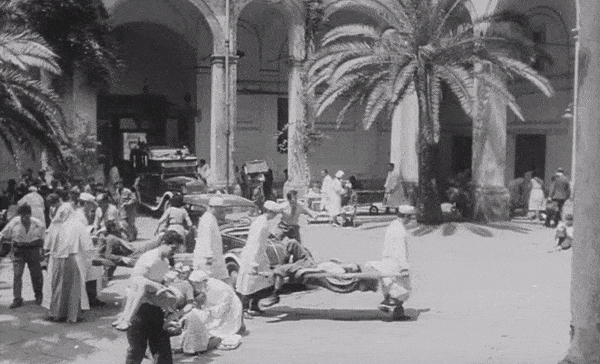Regia / Director: Nanni Loy, 1962
Fuori dall'ospedale, una grande folla cammina di qua e di là, trasportando i feriti su barelle, carretti e carri.
I ragazzi arrivano con il Direttore. Sventolando un fazzoletto bianco legato a un bastone, Aiello passa davanti a un carro funebre: "Fermati! I morti possono aspettare!"
Un uomo sdraiato nel retro del carro funebre si alza e protesta, gesticolando: "Chi è morto? Siamo ancora vivi".
Outside the hospital, a great crowd walks this way and that, transporting the wounded on stretchers, carts, and wagons.
The boys arrive with the Director. Waving a white handkerchief tied to a stick, Aiello steps in front of a hearse: “Stop! The dead can wait!”
A man lying in the back of the hearse sits up and protests, gesturing, “Who’s dead? We’re still alive.”
Un membro del personale lancia materassi da un balcone verso il cortile davanti all’edificio, dove i pazienti vengono curati. Gli operatori si affrettano a distendere i materassi sui telai dei letti.
A staff member throws out mattresses from a balcony to the courtyard in front of the building, where patients are being treated. Workers rush to spread out the mattresses on bed frames.
Ci sono feriti ovunque, supini o appoggiati alla spalla di qualcuno.
There are wounded everywhere, flat on their backs or leaning on someone’s shoulder.
Il tassista che abbiamo incontrato prima sta aiutando a sostenere un uomo ferito. La macchina da presa ci mostra che l'uomo indossa degli stivali, mentre uno dei suoi soccorritori è a piedi nudi.
Una voce chiede: "Questo è un tedesco?"
"Sì, guarda i suoi stivali".
"Un soldato".
The taxi driver we met earlier is helping to support an injured man. The camera shows us that the man is wearing boots, while one of his helpers is barefoot.
A voice asks, “Is this a German?”
“Yes, look at his boots.”
“A soldier.”
Una donna chiede arrabbiata: "Cosa fa qui?"
"Con tutti i giovani che muoiono per strada!"
"Qui non ci sono letti neanche per gli italiani!"
"Chissà quanti ne ha uccisi questo assassino!”
A woman asks angrily, “What’s he doing here?”
“With all the young men dying in the street!”
“There are not even enough beds for the Italians!”
“Who knows how many this murderer’s killed!”
Il tassista chiama: "Dottore! Dottore! Siamo tutti esseri umani. Deve salvare anche lui".
"Per questo perdiamo la guerra!" insiste la donna.
"Non la facciamo per uccidere la gente", ribatte lui, mentre lei lo fissa.
The taxi driver calls, “Doctor! Doctor! We’re all human beings. You must save him also.”
“That’s why we’re losing the war!” the woman insists.
“We’re not making it to kill people,” he counters, as she glares at him.
I ragazzi del carcere minorile appaiono spingendo con cura il Direttore su un carretto. Gennarino è tra loro, ancora con il suo casco di metallo.
The boys from the detention home appear, carefully pushing the Director on a wheeled cart. Gennarino is among them, still in his metal helmet.
"Aiello". Il Direttore fa un debole cenno con una mano. "Fermatevi". I ragazzi si chinano, attenti.
“Aiello.” The Director beckons weakly with one hand. “Stop.” The boys lean over, attentively.
Il Direttore dice ai ragazzi: "Sentite. La guerra l’avete fatta. Siete contenti?" Aiello lo guarda cupo. "Allora tornate all'istituto. Lì almeno siete al sicuro. E forse trovate anche qualche patata".
In primo piano, Aiello risponde: "Ma di cosa si preoccupa? Non ci pensi, cerchi di stare bene".
The Director tells the boys, “Listen. You’ve been in war. Are you satisfied?” Aiello looks at him somberly. “So go back to the institute. There at least you’ll be safe. And maybe you’ll even find some potatoes.”
In close-up, Aiello replies, “What are you worried about? Don’t think about it, try to get well.”
Con grande sforzo, il Direttore continua: "Vi devo dire una cosa, specialmente a te, che sei il più grande".
With great effort, the Director continues, “I have to tell you something, especially you, who are the oldest.”
Guardando Gennarino, dice: "Questo qui, portalo dalla sua mamma". Vediamo il bambino in primo piano, con le lacrime che gli scorrono sul viso. "Hai capito, piccoletto? Lasciali perdere, sono lazzaroni".
Looking over at Gennarino, he says, “This one here, take him to his mother.” We see the boy in closeup, tears streaming down his face. “Did you get it, kid? Forget about them, they’re good-for-nothings.”
"Sei troppo piccolo. Hai visto come ci vuole poco per morire? Lasciali perdere. Me lo prometti?" Gennarino guarda da un’altra parte. Non può promettere di lasciare i suoi nuovi amici.
“You’re too small. Have you seen how little it takes to die? Let them go. Promise me?” Gennarino looks away. He can’t promise to leave his new pals.
Due portantini si avvicinano indaffarati: "Ragazzini, spostatevi!" Trasferiscono il Direttore su una barella.
"Direttore" – dice Aiello – "non si preoccupi. La veniamo a trovare".
"Sì, quando starà meglio!"
"La veniamo a trovare, Direttore!" ripete Gennarino, mentre il Direttore viene portato via.
Two orderlies bustle in: “Make way, kids!” They transfer the Director to a gurney.
“Director,” says Aiello, “don’t worry. We’ll come see you.”
“Yes, when you’re better!”
“We’ll come visit you!” repeats Gennarino, as the Director is taken away.
Con un ultimo saluto, i ragazzi si voltano, armi in pugno, e tornano in strada e in guerra.
With one last wave, the boys turn, guns in hand, and head back to the streets and to the war.
FINE PARTE 19
Here is Parte 20 of this cineracconto. Subscribe to receive a weekly email newsletter with links to all our new posts.





























